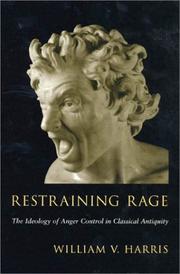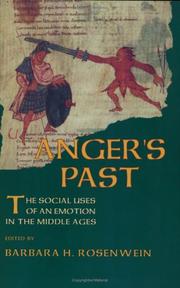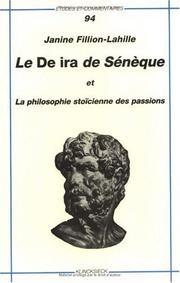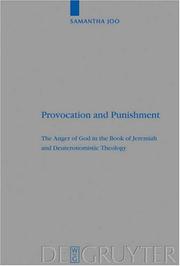| Listing 1 - 10 of 10 |
Sort by
|

ISBN: 0674006186 0674013867 0674038355 9780674038356 9780674006188 9780674013865 Year: 2001 Publisher: Cambridge (Mass.): Harvard university press,
Abstract | Keywords | Export | Availability | Bookmark
 Loading...
Loading...Choose an application
- Reference Manager
- EndNote
- RefWorks (Direct export to RefWorks)
Anger --- Civilization, Classical. --- History. --- Indignation --- Madness --- Wrath --- Rage --- Classical civilization --- Civilization, Classical --- Civilization, Ancient --- Classicism --- Emotions --- Temper --- History --- Anger - Greece - History. --- Anger - Rome - History.
Book
ISBN: 9780715640791 0715640798 Year: 2011 Publisher: Bristol: Bristol classical press,
Abstract | Keywords | Export | Availability | Bookmark
 Loading...
Loading...Choose an application
- Reference Manager
- EndNote
- RefWorks (Direct export to RefWorks)
Anger --- Philosophy, Ancient --- Reason --- Anger. --- Mind --- Intellect --- Rationalism --- Ancient philosophy --- Greek philosophy --- Philosophy, Greek --- Philosophy, Roman --- Roman philosophy --- Indignation --- Madness --- Wrath --- Rage --- Emotions --- Temper --- Philosophy, Ancient. --- Reason.
Book
ISBN: 9782847363050 284736305X Year: 2008 Publisher: Paris: Nouveau monde,
Abstract | Keywords | Export | Availability | Bookmark
 Loading...
Loading...Choose an application
- Reference Manager
- EndNote
- RefWorks (Direct export to RefWorks)
Cette histoire de l'indignation esquisse une chronologie des sujets suscitant ce sentiment qui s'offrent à une société donnée afin de mettre en lumière l'émergence de sensibilités nouvelles. Elle analyse les modalités selon lesquelles s'exprime cette colère, et interroge la puissance de sa mobilisation dans les sociétés démocratiques et son efficacité en tant qu'acteur social.
National characteristics, French --- Anger --- Social change --- Caractéristiques nationales françaises --- Colère --- Changement social --- History --- Social aspects --- Histoire --- Aspect social --- Histoire des mentalités --- --Indignation --- --XIXe-XXe s., --- France --- Politics and government --- Morale sociale --- Débats et controverses --- History. --- Politics and government. --- Caractéristiques nationales françaises --- Colère --- Indignation --- XIXe-XXe s., 1801-2000 --- Anger - France - History --- National characteristics, French - History --- France - Politics and government
Book
ISSN: 19739982 ISBN: 9788889670347 8889670347 Year: 2008 Volume: 7 Publisher: Roma: Herder,
Abstract | Keywords | Export | Availability | Bookmark
 Loading...
Loading...Choose an application
- Reference Manager
- EndNote
- RefWorks (Direct export to RefWorks)
Anger --- Seneca, Lucius Annaeus, --- 241.5 --- 241.5 Theologische ethiek: deugd en ondeugd --- Theologische ethiek: deugd en ondeugd --- Indignation --- Madness --- Wrath --- Rage --- Emotions --- Temper --- Anger - Early works to 1800 --- Seneca, Lucius Annaeus, - approximately 4 BC-65 AD - De ira

ISBN: 1107146852 1280437421 051118414X 0511165684 0511163754 0511312687 0511482124 0511164556 9780511163753 9780511165689 9780511184147 9780521826259 052182625X 052182625X 0521036429 9780521036429 9780511482120 Year: 2003 Volume: 32 Publisher: New York: Cambridge university press,
Abstract | Keywords | Export | Availability | Bookmark
 Loading...
Loading...Choose an application
- Reference Manager
- EndNote
- RefWorks (Direct export to RefWorks)
Anger is found everywhere in the ancient world, starting with the very first word of the Iliad and continuing through all literary genres and every aspect of public and private life. Yet it is only recently, as a variety of disciplines start to devote attention to the history and nature of the emotions, that Classicists, ancient historians and ancient philosophers have begun to study anger in antiquity with the seriousness and attention it deserves. This volume brings together a number of significant studies by authors from different disciplines and countries, on literary, philosophical, medical and political aspects of ancient anger from Homer until the Roman Imperial Period. It studies some of the most important ancient sources and provides a paradigmatic selection of approaches to them, and should stimulate further research on this important subject in a number of fields.
Classical literature --- Anger in literature. --- Anger --- Indignation --- Madness --- Wrath --- Rage --- Emotions --- Temper --- History and criticism. --- Anger in literature --- History and criticism --- Arts and Humanities --- History --- Greece --- Rome --- Classical literature - History and criticism. --- Anger - Greece. --- Anger - Rome.

ISBN: 9780801483431 0801432669 0801483433 9780801432668 150171869X Year: 1998 Publisher: Ithaca, N.Y.: Cornell university press,
Abstract | Keywords | Export | Availability | Bookmark
 Loading...
Loading...Choose an application
- Reference Manager
- EndNote
- RefWorks (Direct export to RefWorks)
Affective and dynamic functions --- World history --- anno 500-1499 --- Anger --- Social history --- Emotions --- Civilization, Medieval --- Colère --- Histoire sociale --- Civilisation médiévale --- Social aspects --- History --- Aspect social --- Histoire --- History. --- Colère --- Civilisation médiévale --- Indignation --- Madness --- Wrath --- Rage --- Temper --- Anger - History --- Social history - Medieval, 500-1500
Book
ISBN: 3518418408 9783518418406 Year: 2006 Publisher: Frankfurt am Main: Suhrkamp,
Abstract | Keywords | Export | Availability | Bookmark
 Loading...
Loading...Choose an application
- Reference Manager
- EndNote
- RefWorks (Direct export to RefWorks)
Anger --- Anger. --- Capitalism --- Political science --- Thymos (The Greek word) --- Religious aspects --- Christianity. --- Judaism. --- Philosophy. --- Thymos (The Greek word). --- Indignation --- Madness --- Wrath --- Rage --- Emotions --- Temper --- Thumos (The Greek word) --- Greek language --- Political philosophy --- Religious aspects&delete& --- Christianity --- Judaism --- Philosophy --- Etymology --- Deadly sins

ISBN: 286563082X 9782865630820 Year: 1984 Volume: 94 Publisher: Paris: Klincksieck,
Abstract | Keywords | Export | Availability | Bookmark
 Loading...
Loading...Choose an application
- Reference Manager
- EndNote
- RefWorks (Direct export to RefWorks)
Anger --- Stoics --- Emotions (Philosophy) --- Seneca, Lucius Annaeus, --- 871 SENECA, LUCIUS ANNAEUS --- Philosophy --- Ethics --- Philosophy, Ancient --- Indignation --- Madness --- Wrath --- Rage --- Emotions --- Temper --- Latijnse literatuur--SENECA, LUCIUS ANNAEUS --- Anger. --- Stoics. --- 871 SENECA, LUCIUS ANNAEUS Latijnse literatuur--SENECA, LUCIUS ANNAEUS --- Emotions (Philosophy). --- Sénèque. De ira. --- Seneca (Lucius Annaeus). De ira. --- Sénèque --- Seneca, Lucius Annaeus, - approximately 4 BC-65 AD - De ira --- Sénèque (0004 av. j.-c.-0065). de la colère --- Stoïciens --- Stoïcisme

ISSN: 09342575 ISBN: 3110189941 9783110189940 3110909936 Year: 2006 Volume: 361 Publisher: Berlin: de Gruyter,
Abstract | Keywords | Export | Availability | Bookmark
 Loading...
Loading...Choose an application
- Reference Manager
- EndNote
- RefWorks (Direct export to RefWorks)
This book examines the problem of theodicy arising from the fall of Jerusalem (587 B.C.E.) in the book of Jeremiah. It explores the ways in which the authors of the book of Jeremiah tried to explain away their God's responsibility while clinging to the idea of divine mastery over human affairs. In order to trace the development of a particular book's understanding of God's role in meting out punishments, this book analyzes all the passages containing the word pivotal, הכעיס ("to provoke to anger") in Deuteronomistic History and the book of Jeremiah.
Anger --- Deuteronomistic history (Biblical criticism) --- Biblical teaching --- 224.3 --- 222.4 --- Jeremias. Lamentationes. Klaagliederen --- Deuteronomium --- Biblical teaching. --- Bible. --- Criticism, interpretation, etc. --- Deuteronomic history (Biblical criticism) --- Deuteronomists (Biblical criticism) --- DH (Biblical criticism) --- D document (Biblical criticism) --- Indignation --- Madness --- Wrath --- Rage --- Emotions --- Temper --- Jeremiabuch --- Jeremiah (Book of the Old Testament) --- Jérémie (Book of the Old Testament) --- Livre de Jérémie --- Yirmeyah (Book of the Old Testament) --- Yirmeyahu (Book of the Old Testament) --- Anger - Biblical teaching --- Book of Jeremiah. --- language usage.
Book
ISBN: 9027225583 9786613359001 1283359006 9027279276 9789027225580 9789027279279 9781283359009 1556190093 6613359009 Year: 1986 Volume: 7/8 Publisher: Amsterdam: Benjamins,
Abstract | Keywords | Export | Availability | Bookmark
 Loading...
Loading...Choose an application
- Reference Manager
- EndNote
- RefWorks (Direct export to RefWorks)
This study is an attempt to uncover the structure of three emotion concepts: anger, pride and love. The results indicate that the conceptual structure associated with these emotions consists of four parts: (1) a system of metaphors, (2) a system of metonymies, (3) a system of related concepts, and (4) a category of cognitive models, with a prototypical model in the center. This goes against an influential view of the structure of concepts in linguistics, psychology, anthropology, according to which the structure of a concept can be represented by a small number of sense components.
Lexicology. Semantics --- English language --- Semantiek --- Concept. --- Woede --- Hoogmoed. --- Liefde --- Métaphore. --- Sémantique --- Colère --- Orgueil. --- Amour --- Metafoor. --- Metaphor. --- Semantics. --- Concepts. --- Anger. --- Pride and vanity. --- Love. --- Affection --- Emotions --- First loves --- Friendship --- Intimacy (Psychology) --- Vanity --- Conduct of life --- Deadly sins --- Folly --- Snobs and snobbishness --- Indignation --- Madness --- Wrath --- Rage --- Temper --- Concept formation --- Abstraction --- Knowledge, Theory of --- Perception --- Psychology --- Formal semantics --- Semasiology --- Semiology (Semantics) --- Comparative linguistics --- Information theory --- Language and languages --- Lexicology --- Meaning (Psychology) --- Parabole --- Figures of speech --- Reification --- Anglais (langue) --- Semantique --- Linguistique anthropologique
| Listing 1 - 10 of 10 |
Sort by
|

 Search
Search Feedback
Feedback About UniCat
About UniCat  Help
Help News
News